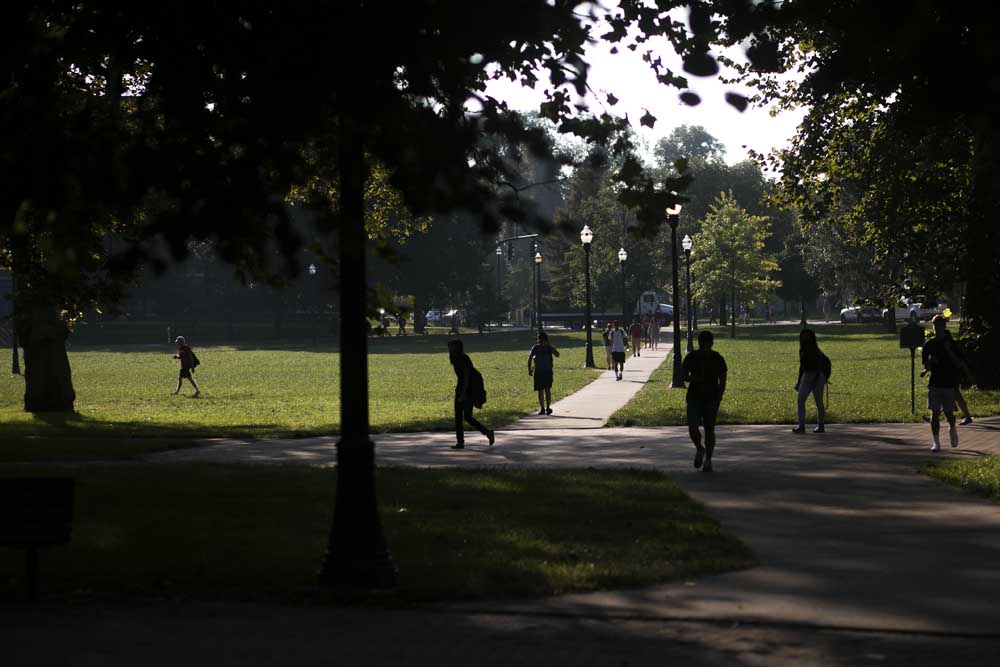A culture of sports and winning above all
Published 12:00 am Friday, August 31, 2018

- The Ohio State University campus in Columbus, Aug. 28, 2018. Jeffrey Wadsworth, a university trustee, resigned his post on Aug. 30, saying that a three-game suspension of its football coach, Urban Meyer, was too soft, given his mishandling of domestic violence accusations against an assistant coach. (Maddie McGarvey/The New York Times)
COLUMBUS, Ohio — On any given Saturday, the nearly 105,000-seat home stadium of the Ohio State football team shakes and sways as the team, more often than not, roars to victory in a weekly manifestation of the university’s grip on the psyche of the state.
With alumni including the governor, a U.S. senator, the state treasurer, several members of congress and leaders from business, industry, the legislature and the arts, Ohio State has long been an indomitable civic force.
Yet as its nearly 60,000 students arrive on campus for a new semester — and football season — scandals tied to the university’s sports program have forced many at Ohio State to question its culture of sports above all, as well as the men who lead it.
The day after fall-term classes began, Urban Meyer, the university’s celebrated football coach and among the most successful ever in college sports, was suspended for three games over his handling of the case of a former assistant coach accused of domestic violence. Earlier in the summer, more than 100 former students came forward with allegations that a former team doctor had molested them years ago; three lawsuits have been filed against the university alleging it enabled a sexual predator.
University officials and many alumni insist there is no endemic problem here, just isolated cases the university is moving to address. Earlier this month, the university announced it was creating a central office for responding to sexual harassment and violence.
Still, for the first time in a long time, difficult conversations have begun over whether the university’s priorities are in order. Some students, many of them women, have criticized Meyer’s punishment as too light, calling it an example of the power he commands in a state that has relied on his winning ways to deliver millions in revenue to its flagship university.
“I feel like everyone just wants to justify his actions because he means so much to the university and he brings in so much money,” Layla Khalid, a 20-year-old student in international studies, said Monday as she left class. A full-season suspension, she added, would have made clear that the university took the allegations seriously.
“Football means so much to Ohio State,” she said. “It’s basically a religion on campus. If he was gone and we were to lose games, that would kind of destroy the morale of students.”
Many students have rallied in support of Meyer, even as many commentators outside the university clamored for his firing after investigators found he had kept crucial information about his longtime assistant’s misconduct from most university officials and had sought to erase his own cellphone records. The assistant coach, Zach Smith, was accused by his former wife, Courtney Smith, of physically abusing her on more than one occasion. Meyer was also suspended from practices for several weeks. The athletic director, Gene Smith, who is not related to the assistant coach, was suspended for two weeks.
One bit of context was difficult to ignore: Meyer’s success over the past six seasons, with a 73-8 record and a national championship after the 2014 season.
“I’m conflicted,” Malcolm Guy, 21, a political science student, said while dining at a student center. “I’m a huge Ohio State fan, and also I think the university needed to come down on Meyer a little harder because we need to send a stronger message to the community that this is not acceptable.”
Some students suggested the university had missed an opportunity to take a more aggressive stance against domestic violence. Francesca Savona, 20, who is studying molecular genetics, called the three-game suspension “sort of a slap on the wrist.”
“It seems like if that happened to me,” she said, referring to domestic abuse, “and I told a department chair, the fact that nothing happened until the story broke kind of concerns me.”
Domestic violence experts have warned that the university’s handling of the case could give victims second thoughts about speaking out. Nancy Neylon, executive director of the Ohio Domestic Violence Network, said the university needed to make sure victims felt safe reporting domestic violence so they could get help.
“My concern is that it puts women in more danger,” she said. “If for some reason someone didn’t feel comfortable coming forward because of the way the university handled it, that’s a concern to me.”
The Columbus Dispatch published a searing editorial Sunday saying Ohio State could no longer be blind to domestic violence and sex abuse. As for Meyer, “it’s hard to understand how he could decline for so long to step in or speak up about a situation so fraught with danger,” the editorial said.
Some alumni see recent events as examples of the university’s focus on athletics over academics. Donald Ray Pollock, a prominent author and Ohio State alumnus who has written about the bleakness of life in a southern Ohio village, pointed to recent changes in the creative writing program as a sign of the university’s skewed priorities.
“It appears that the university will do anything to save its football team, but doesn’t seem to mind in the least about killing off another arts/humanities program,” said Pollock, who completed the writing program in 2009. A university spokesman confirmed a position was eliminated in the program but said the overall number of faculty — whose budget is separate from athletics — had grown.
Michael Drake, the university president, said last week the various scandals involving university athletics occurred “over a span of 40 years and multiple generations of leadership” and were unrelated to one another, “except that they happened to happen here.”
Many in the Ohio State community simply want to move on, believing the university properly handled a challenging problem. Preston Newkirk, 18, an engineering student, said the university had struck the right balance by holding Meyer accountable.
“I think Ohio State handled it well, which is why I don’t think people will change how they feel about the university,” Newkirk said.
Terry Casey, a veteran political consultant and Ohio State alumnus, said he hoped the scandal would be viewed as a learning experience.
“My sense of Columbus is that people love the Buckeyes, but they also recognize, in this era of #MeToo, these things must be handled seriously and appropriately,” Casey said. “People who are Ohio State graduates, like me, they don’t want Ohio State just viewed as a football factory.”






